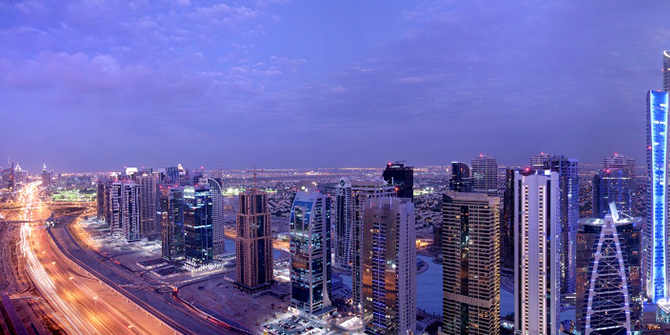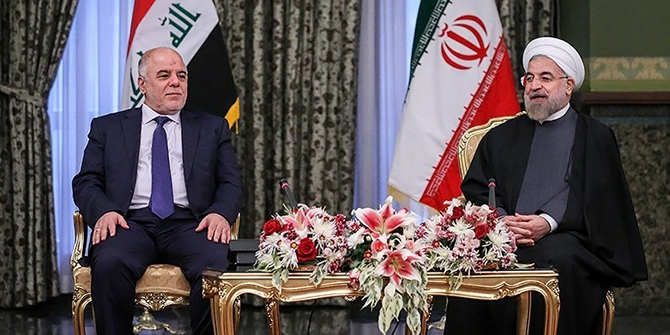by David Mednicoff1
This memo was presented at a workshop organised by the LSE Middle East Centre and the UAE National Defense College on 12 January 2016.

The interconnection of law, business and politics highlights law’s significance to the political economies in the GCC. What may be less obvious are benefits to Khaliji political economy because the migration of legal actors and ideas to and from the GCC has sustained engagement with diverse legal norms. My current research suggests that GCC countries’ legal transnational connections have fostered space to shape legal hybridity that contributes to Gulf countries’ broader global integration generally.
Dramatic hyperglobalised2 growth in the GCC has meant a major, and in Qatar and the UAE, majoritarian, proportion of resident migrant workers, including lawyers, judges, advisors and professors. With a dominant portion of the legal establishment originating from foreign Arab and western jurisdictions, most GCC countries have escaped two inter-related predicaments common to some Arab countries. First, a substantially hybridised set of legal practitioners subject to transnational scrutiny has made it harder for authoritarian state structures to capture the legal system entirely. Court cases in Qatar and the UAE often involve foreigners, receive attention outside of the GCC, and include non-native judges. This makes it harder for mukhabarat institutions to co-opt the judiciary, as has occurred in other Arab states, including Egypt, the one with the strongest history of judicial review. (Moustafa 2009)
A second predicament, reduced by GCC states’ transnational legal connections, is that legal systems in Arab countries tend to be insular. Algeria, the Sudan, and Yemen, for example, have developed their rule of law in individualised ways that hinder comparative reference points with other systems and can stand in the path of broader transnational cooperation.
In most GCC states, rapid prominence has meant that the legal establishment and framework have had to grow swiftly, since few legal actors existed before the oil boom. The architecture of the legal system in countries like Qatar and the UAE has been peculiar in its speed, embeddedness in the global political economy, and strong hybridisation. Gulf law has therefore developed with significant intercultural contact. Such contact has contributed to the broader sociopolitical stability of GCC countries, as well as to the strength of these countries’ integration in broader global fora.
Hybridised growth has permeated Qatari and Emirati legal institutions. Qatar’s law college has long included Egyptian, Jordanian, British, American, as well as increasingly native faculty, and links with foreign rule-of-law advisors. It has been supplemented recently by a US-inspired post-graduate programme. The UAE’s Dubai International Financial Centre’s independent business-oriented jurisdiction applies British common law in arbitration cases, running in tandem with the national courts.
However, GCC legal hybridity hardly eliminates tensions around legal issues. I experienced this when my research presentation to Qatari policy graduate students – who often hold government jobs – began with heated questions about the attitudes of a non-native like myself towards the country’s legal system. As students later affirmed, this reflected sensitivity Qataris often feel towards frequent western critiques of human rights and other legal standards in Qatar. The gap between the opinions of foreign and native lawyers on the effectiveness of Qatari lawyers and law, as well as whether foreign lawyers should have standing to appear in court, suggest differences among diverse legal actors in Qatar.
Broader legal disagreements invoke strong views within and outside the GCC. (e.g., Mednicoff 2012) A recent example was western outrage over the 2014 Qatari conviction, later overturned, of an American couple resident in Doha for endangerment of a child they adopted who died. Different norms around adoption and ethnicity among Qataris and Americans helped explain a striking divergence of expectations between the couple involved and some Qatari legal actors.
Thus, the large-scale presence of legal hybridity in the GCC hardly means conflict-free legal concord. Instead, hybridity creates a comparatively stable space for legal contestation consistent with broader global GCC integration. The UAE and Qatar not only import, and intersect with, diverse global practitioners of law; they frequently use their resources to host high-level gatherings of international law. GCC state sponsorship of such global legal events may seem a ploy to detract from tensions around human rights, kafala or other flashpoints. I suggest instead that these events and tensions are part of an inter-related climate for the contestation of legal norms that stems from the integration in the GCC of diverse, global influences as a core feature of legal development.
 Professor David Mednicoff is Director of the Middle Eastern Studies Program and a professor in the School of Public Policy at the University of Massachusetts–Amherst. He is also Lead Principal Investigator on the ‘Rule of Law in the Gulf Project’ (Qatar National Research Fund). His areas of expertise include Middle Eastern law and politics, international law, human rights, globalisation studies and comparative public policy. David tweets at @mednic.
Professor David Mednicoff is Director of the Middle Eastern Studies Program and a professor in the School of Public Policy at the University of Massachusetts–Amherst. He is also Lead Principal Investigator on the ‘Rule of Law in the Gulf Project’ (Qatar National Research Fund). His areas of expertise include Middle Eastern law and politics, international law, human rights, globalisation studies and comparative public policy. David tweets at @mednic.
Other memos presented at the workshop:
- A Vexing Question of Female Labour and Migration in Resource-Dependent States
by Karen E. Young - Cutting out the Middle Man: GCC Economic Strategies for Tackling Migration Racketeering
by Omar Al-Ubaydli
- Neoliberal Citizenship: The Transformation of Belonging
by Kevin W. Gray
- Globalisation and Human Trafficking: The GCC and the Rest
by Samuel R. Greene and Nathan W. Toronto
References:
David Mednicoff, ‘The Legal Regulation of Migrant Workers, Politics and Identity in Qatar and the United Arab Emirates’, in Mehran Kemrava (ed.), Migrant Workers and Arab Persian Gulf States (New York: Columbia and Hurst, 2012), pp. 187–215.
Tamir Moustafa, The Struggle for Constitutional Power: Law, Politics and Economic Development in Egypt (Cambridge: Cambridge University Press, 2009).
Arvind Subramanian and Martin Kessler, ‘The Hyperglobalization of Trade and its Future’, Working Paper Series 13 (Washington: Peterson Institute for International Economics, 2013).
1 I am grateful to the Qatar National Research Fund for its support for NPRP grant 6-459-5–050, as well as to Noha Aboueldahab, Susan Newton, Gwenn Okruhlik, Lubna Sharab, Sylvain Taouti and RA’s at Qatar University and the University of Massachusetts-Amherst for their invaluable contributions.
2 I use the term hyperglobalisation not in a general sense to describe the overall rate of globalisation, throughout the world, such as the general intensification of trade integration since the late-20th-century (e.g., Subramanian and Kessler 2013). Instead, I mean to denote societies, such as Singapore, the UAE and Qatar, in which the multifaceted extent of globalised development has been particularly intense and concentrated in global comparison, as evidenced by factors such as rapidity of political economy growth, economic significance of trade, and migrant worker involvement.







Great informative article